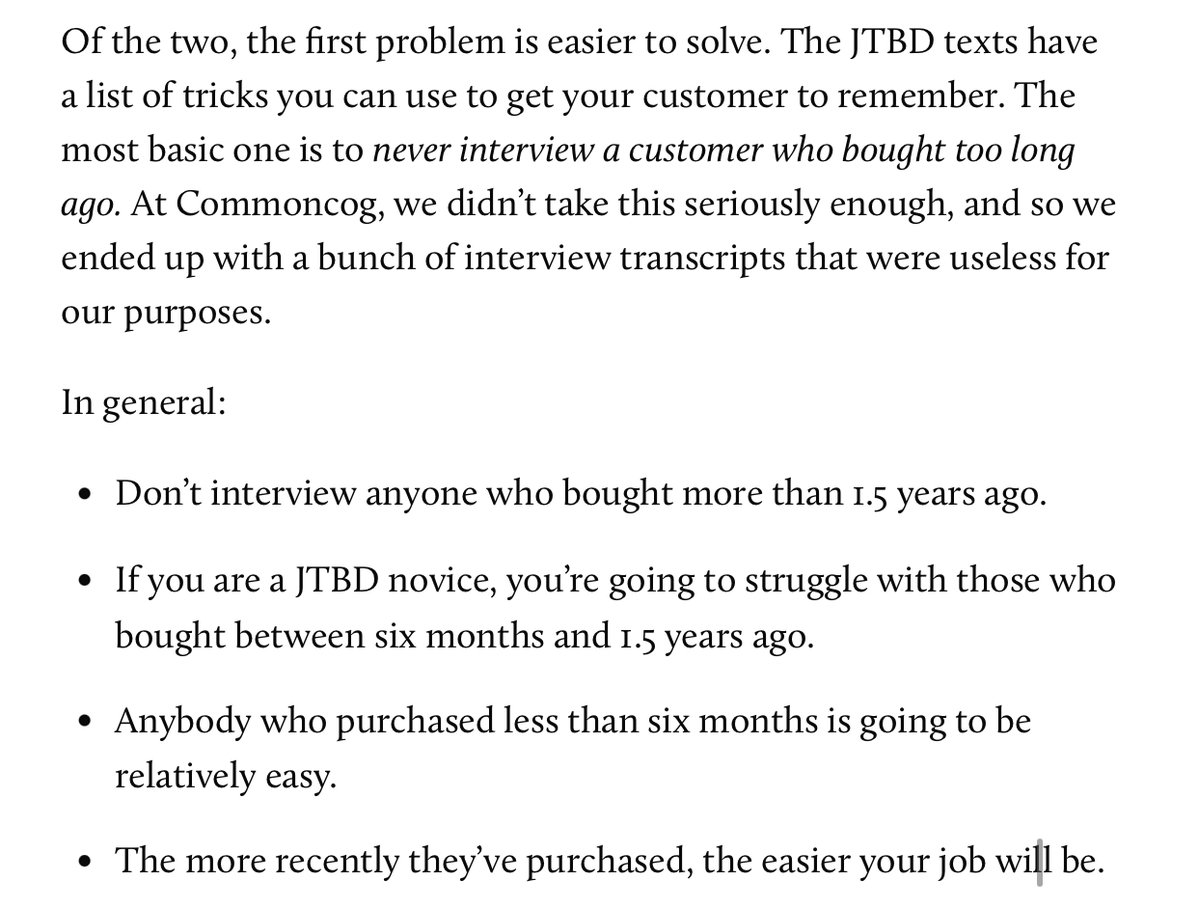Here’s what I wish someone had told me before I ran a JTBD interview process for the first time.
Let’s back up: you’ve probably heard of the Jobs to be Done Framework.
Typically: “customers buy for a ‘JTBD’.”
But the framework excels at learning HOW your customers buy.
Let’s back up: you’ve probably heard of the Jobs to be Done Framework.
Typically: “customers buy for a ‘JTBD’.”
But the framework excels at learning HOW your customers buy.
This is a HUGE win.
If you can find out how, exactly, your customers buy you:
- You can design your product for that journey.
- You can meet your customers where they are.
- You know what progress they’re trying to make!
Alas: the way to get there is tricky.
If you can find out how, exactly, your customers buy you:
- You can design your product for that journey.
- You can meet your customers where they are.
- You know what progress they’re trying to make!
Alas: the way to get there is tricky.
I think most folks don’t realise the JTBD framework comes with its own interview process. (I certainly didn’t!)
But a) it’s really powerful.
b) the bad news is that it takes a lot of skill to execute.
(You’d think they would advertise that disclaimer, but, alas).
But a) it’s really powerful.
b) the bad news is that it takes a lot of skill to execute.
(You’d think they would advertise that disclaimer, but, alas).
So how does this interview work?
The central conceit of the Jobs to be Done framework* is that everyone buys in the exact same way.
(*There are two JTBDs — I’m talking about the one by the Re-Wired group, not the one by Ulwick).
The JTBD Timeline looks like this:
The central conceit of the Jobs to be Done framework* is that everyone buys in the exact same way.
(*There are two JTBDs — I’m talking about the one by the Re-Wired group, not the one by Ulwick).
The JTBD Timeline looks like this:

Buyers move along the timeline once they hit a ‘buying trigger’ for each stage.
The goal of the JTBD interview is to figure out what the specific timeline for YOUR product is + what these buying triggers are, so you may INFLUENCE THEM. 😈🤑
Why is this hard?
The goal of the JTBD interview is to figure out what the specific timeline for YOUR product is + what these buying triggers are, so you may INFLUENCE THEM. 😈🤑
Why is this hard?
Well, for starters you’re asking folks to tell you HOW THEY BOUGHT A THING.
What can go wrong?
A LOT OF THINGS. LIKE, THEY WILL LIE TO YOU.
(Not in an evil way. In a “we don’t really know why we do things way.”)
What can go wrong?
A LOT OF THINGS. LIKE, THEY WILL LIE TO YOU.
(Not in an evil way. In a “we don’t really know why we do things way.”)
So, one of the first things the JTBD folks tell you is: do not interview folks who bought too long ago, where ‘long ago’ is more than a year.
This is very good advice that you would do well to follow. (Guess how I know?)
Rule of thumb:
This is very good advice that you would do well to follow. (Guess how I know?)
Rule of thumb:

What they DON’T tell you, however:
Stagger your interviews so you interview those who bought recently FIRST, when you are the most unskilled at interviewing, and then slowly shift to those who bought longer and longer ago, as you get better.
Obvious!
Stagger your interviews so you interview those who bought recently FIRST, when you are the most unskilled at interviewing, and then slowly shift to those who bought longer and longer ago, as you get better.
Obvious!

Here’s another thing they DID say, that I wish I paid attention to:
Conduct the JTBD interview as a pair!
Gaaaah. The interview format itself is very cognitively demanding, so it really helps if there are two brains catching and helping each other.
(Guess how I know?)
Conduct the JTBD interview as a pair!
Gaaaah. The interview format itself is very cognitively demanding, so it really helps if there are two brains catching and helping each other.
(Guess how I know?)

The reason it’s hard to do qualitative customer interviews is that it takes a fair bit of skill and effort to deeply grok what they’re telling you.
I think, writing this piece was the first time I managed to articulate why it’s so hard, which I got by accident elsewhere:
I think, writing this piece was the first time I managed to articulate why it’s so hard, which I got by accident elsewhere:

If you'd like more on this, I've got a few more notes available in the full piece:
Including a walkthrough of one of the findings we found when running the JTBD project on Commoncog's paying members.commoncog.com/putting-jtbd-i…
Including a walkthrough of one of the findings we found when running the JTBD project on Commoncog's paying members.commoncog.com/putting-jtbd-i…
• • •
Missing some Tweet in this thread? You can try to
force a refresh






